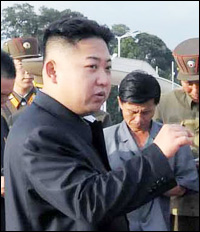
Is China-style reform afoot in NK?

North Korean leader Kim Jong-un made a splash this month by attending a concert featuring the American classic “My Way” in a surprising embrace of Western culture. Indeed, the twenty-something’s recent moves suggest he is following his own path.
He raised eyebrows again this week when state media revealed the identity of his wife, Ri Sol-ju, a woman who comports herself with the air of a first lady. Such departures from the previous norm, though subtle, have led watchers to suggest the isolated regime may be gearing up for gradual reform in the footsteps of neighboring China.
Since taking power following the death of his father Kim Jong-il in December, he has stressed the livelihood of the people, reportedly ordered cadres to explore ways to fix the economy and used the phrase “global trends” during site visits. Delegations have traveled to China and Canada to study capitalism.
Beijing is Pyongyang’s biggest trading partner and source of aid, and urged its late leader Kim Jong-il to follow its footsteps of reform.
“Latecomers such as North Korea are in a better position to make use of examples before them,” said Paik Hak-soon, an analyst at the Sejong Institute in Seoul. “The North is likely to take a lot from China and Vietnam, which kept their political systems intact by introducing gradual economic changes.”
He said that because Pyongyang has a booming rival in the South, it is not likely to practice the “shock therapy economics” reforms of post-Soviet states. Though it may closely follow the footsteps of other Asian nations, it is likely to trumpet any reforms as the “(North) Korean way,” he added.
Beginning in the late 1970s, Chinese reformists led by Deng Xiaoping led a gradual integration of market principles, first reforming the agricultural system and opening up to foreign investment; and later privatizing state-run industries and easing protectionist policies.
The North is reportedly already tinkering with agricultural reforms, with defector groups saying measures have been implemented in some areas to increase the proportion of crops that farming families can keep. It remains to be seen whether the moves will be expanded or how they will be received.
Pyongyang has also passed revisions to its regulations for foreign investors, apparently streamlining procedures to attract more investment. Infrastructure has rapidly developed at its special economic zone in the country’s northeast, paving the way for greater Chinese and Russian involvement.
Kim may have earned himself some room to maneuver by sacking Army chief Ri Yong-ho earlier this month and replacing the influential figure with his own man. The regime has stacked military ranks with party figures such as Kim’s uncle Jang Song-thaek and Choi Ryong-hae. Reform measures in 2002 to introduce market elements were scuttled by military hardliners.
Initial moves would be more of an acknowledgement than a policy shift, analysts say, as the regime has in recent years turned a blind eye to informal markets that sprung up as the state distribution system faltered and the country experienced a massive famine in the late 1990s.
“Some signals (of change) could lead to local officials to do a more efficient job of managing the actual economy that is going on instead of denying the existence of market forces ― manage it and guide it,” said John Delury, an assistant professor at Yonsei University, noting that Chinese reform was the result of years of experimentation.
Korea University professor Yoo Ho-yeol took a cautious stance, saying reform would be difficult without a fundamental change in Pyongyang’s stance on its nuclear program ― a bargaining chip most believe it will be hard pressed to give up ― due to international sanctions.
“They may be testing to see foreign and domestic reaction before undertaking major change. But without the lifting of the sanctions real change will be hard,” Yoo said, adding he was watching to see if the North would meet conditions for the resumption of nuclear negotiations. <The Korea Times/Kim Young-jin>


